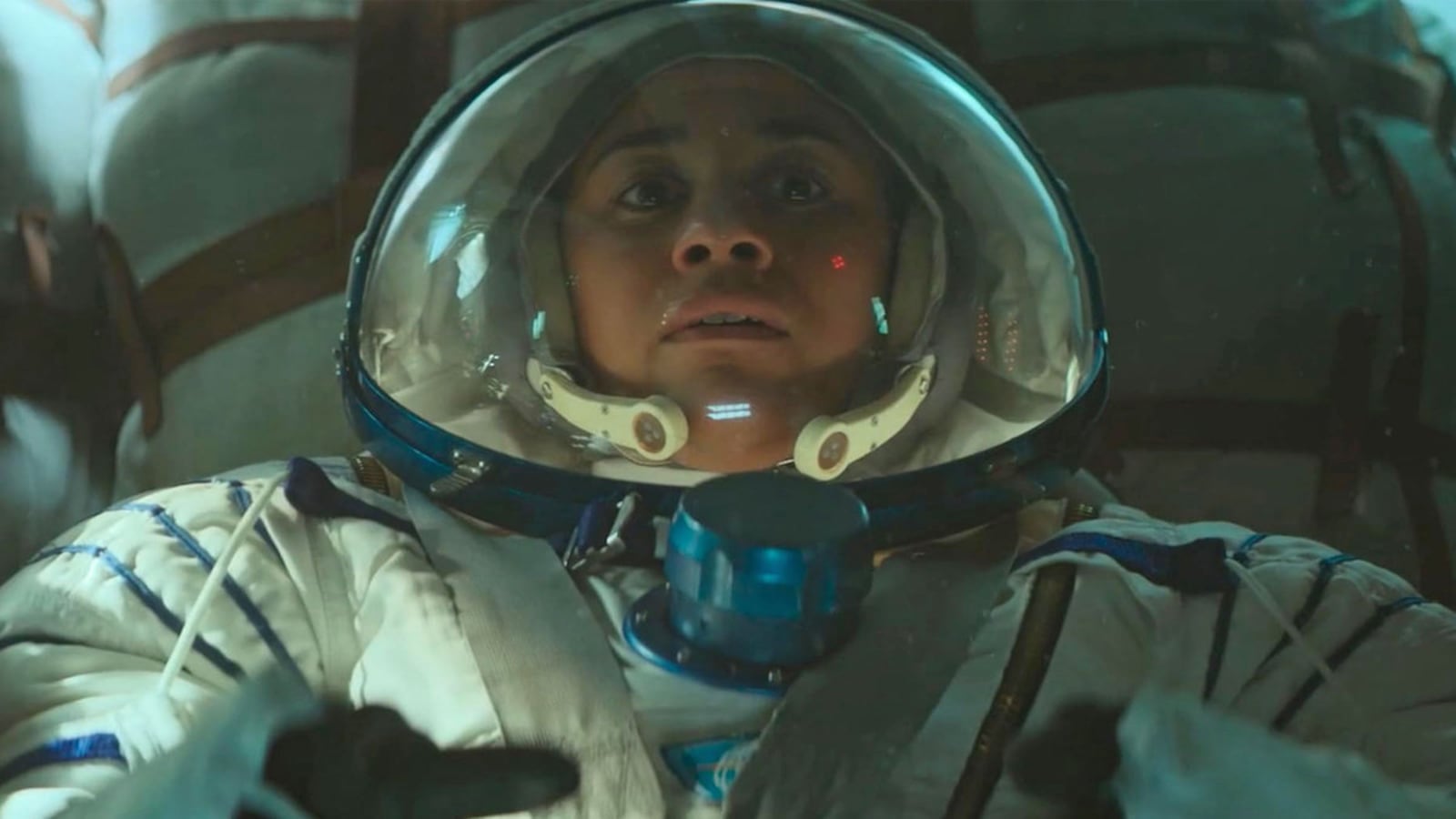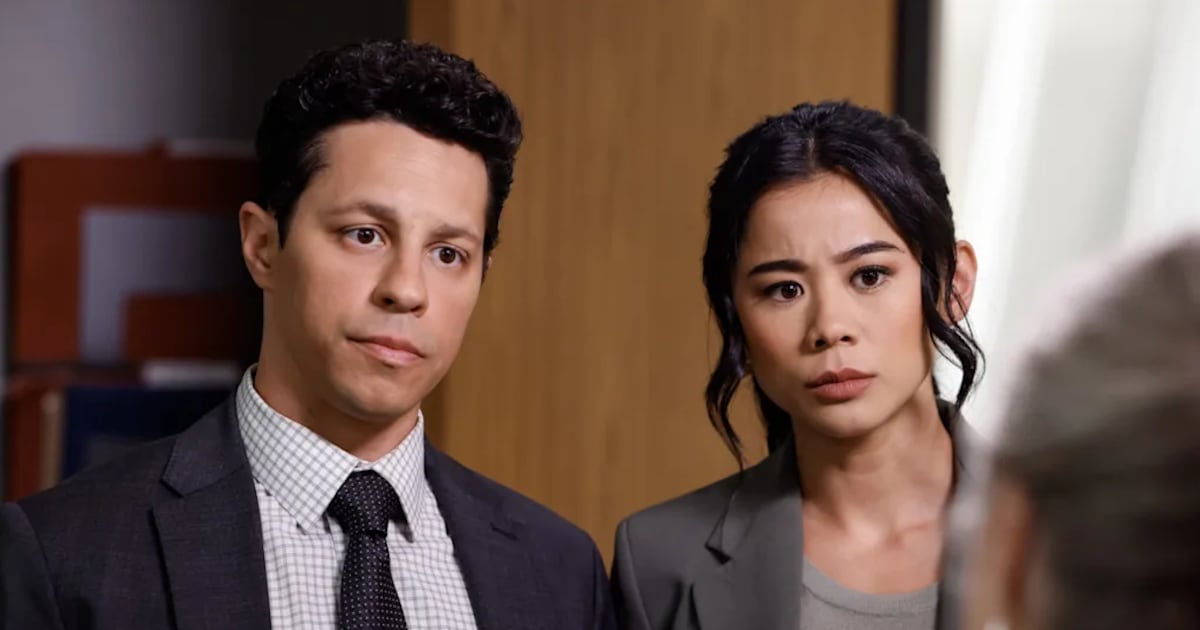In space, no one can hear you sing, “Angela Bassett did the thing,” but if you’re Ariana DeBose, they can watch you go through cliched and illogical sci-fi motions in I.S.S., a pedestrian thriller (in theaters Jan. 19) that never generates a modicum of suspense. For her big-screen follow-up to her Oscar-winning turn in West Side Story, the actress hits only flat notes as an astronaut who boards the International Space Station and swiftly finds herself in the middle of a testy stand-off with her Russian counterparts. Intrigue and murder ensue, albeit with all the excitement of a trip to the bathroom.
As spelled out by opening text, the International Space Station was designed as a symbol of harmonious post-Cold War collaboration between the United States and Russia, with both countries partnering on scientific, medical and space exploration research. Such togetherness is alive and well when Americans Kira (DeBose) and Christian (John Gallagher Jr.) land at the I.S.S. courtesy of the Soyuz rocket that transports astronauts from Earth. The two are happily greeted by their veteran comrade Gordon (Chris Messina) as well as Russians Alexey (Pilou Asbæk), Nicholai (Costa Ronin), and Weronika (Maria Mashkova), the last of whom is currently in a relationship with Gordon that they laughably believe they’ve kept secret. Once introductions are finished, Kira sets up shop in her laboratory, where she’s doing something or other with a collection of mice and promptly rubs Alexey the wrong way.
This minor initial interaction suggests that Alexey is going to be a problem. However, as scripted by Nick Shafir and directed by Gabriela Cowperthwaite, I.S.S. simultaneously fails to make Kira the least bit likable. As they travel to the station, Kira listens to Christian talk about his two beloved daughters and marital problems with what appears to be moderate-at-best interest, and she’s a dour killjoy when, later that night, everyone shares a few drinks and sings along to “Winds of Change”—a song that eventually leads to a minor quarrel between Gordon and Alexey. Taken to the cupola to get her first real-world glimpse of Earth from above, she’s conspicuously detached, and certainly doesn’t experience “the overview effect” in which the sight of the planet (and its lack of borders) begets a “spiritual awakening.”
Kira is a wet blanket about whom we’re supposed to care simply because the film has deemed her the protagonist. As she subsequently explains to Gordon, her fiancé recently cheated on her, compelling her to believe that “it’s just better to go it alone”—a bad attitude for a mission that’s built on cooperation with America’s political rivals. Nonetheless, her chilliness proves to be an asset after things go dreadfully south. In the cupola, Kira witnesses multiple explosions on the Earth’s surface, and as they proliferate, an emergency transmission informs Gordon that the U.S. and Russia are now at war with each other, and that the crew’s new mission is to take control of the I.S.S. “by any means necessary.” Gordon keeps this a secret from his Russian counterparts. Still, as he immediately grasps, that’s mostly pointless, since they’ve undoubtedly received the same message. War down there invariably means war up here.
Following this missive, the power goes out, the radios go dark, and the station’s propulsion systems go kaput. The last of these is especially worrisome because the I.S.S. has apparently been flying in low orbit in order to receive supplies faster—meaning that without a change in their situation, they’re destined to fall to their deaths in 24 hours. As far as ticking-clock scenarios go, this is a hastily sketched one, but that’s no different than the rest of the film, whose characters are paper-thin, insubstantial, and whose dilemmas are mundane and familiar. To fix their outpost’s broken antenna, Gordon breaks protocol and heads outside on his own and, upon discovering that he can’t make it to his destination while remaining tethered to the station, he disconnects himself, only to suffer a seemingly dire fate. It’s 2001: A Space Odyssey redux, with none of the originality and even less of the terror. In the wake of this calamity, the atmosphere inside the I.S.S. grows tenser, with everyone scrambling to grapple with their directives to eliminate each other.
Whereas I.S.S. promises a claustrophobic kill-or-be-killed scenario, what materializes is scheming that goes from wan to ludicrous at light speed. It’s no shock that one Russian operative turns out to be an untrustworthy monster determined to fulfill their orders. Less sensical, however, are numerous other figures behaving so stupidly that they practically court their own misfortune. Worse, the film ultimately treats certain individuals as “good” and others as “bad” despite the particulars of the plot contradicting those characterizations. By the time one person is being cast as a villain for trying to sneak back to Earth—even though the supposed “hero” was, hours earlier, planning to do the exact same thing—it feels like the proceedings have stopped paying attention to themselves.

The cast of I.S.S.
LD EntertainmentI.S.S. never justifies its own outlook on its characters, and it flops just as hard in establishing its dramatic stakes. The fact that the I.S.S. is on the verge of plummeting to Earth comes across as tossed-off and secondary, and the revelation that the crew is in possession of a cure for radiation sickness—which will be highly coveted in an ongoing nuclear war—is drearily convenient. At least director Cowperthwaite brings her outer-space setting to realistic life, her camera twirling about as it navigates zero-gravity corridors and squeezes into phone booth-style sleeping quarters. Her CGI is also reasonably sturdy, although given how many genre predecessors have already sky-walked this terrain, there’s nothing noteworthy about her vistas of the station floating in Earth’s orbit or the planet engulfed in an ever-expanding blanket of flames.
A touch of The Twilight Zone energy lurks on the film’s periphery, yet Cowperthwaite and Shafir squander it, content to merely have DeBose and company grimace, scream, and share covert looks with one another on the way to their deflating (and perplexing) finale. Trust may be a hard thing to come by in I.S.S., but so is a reason to care.






